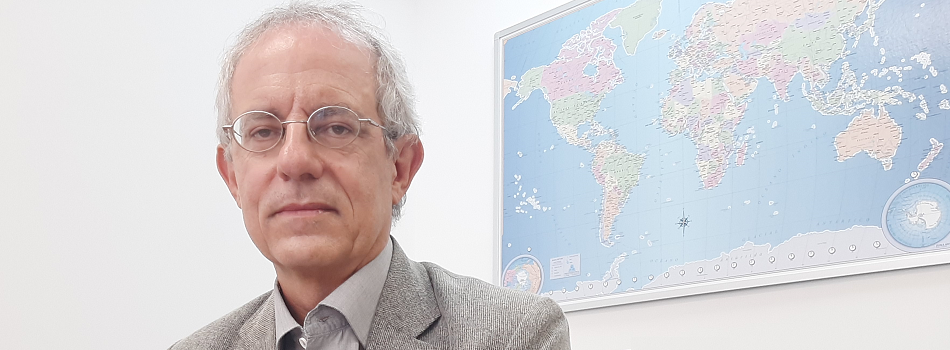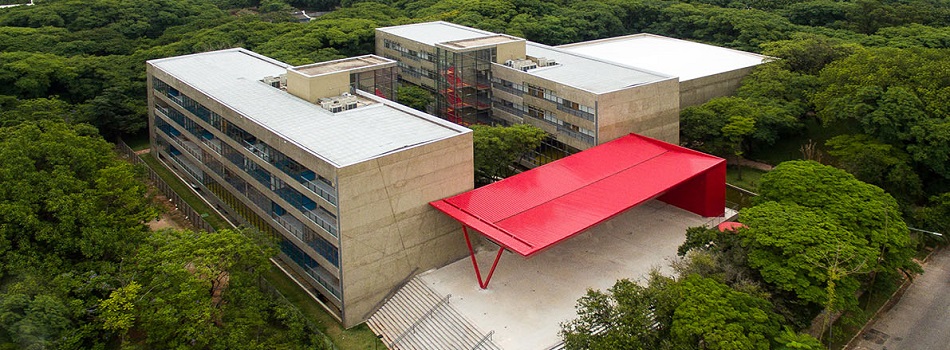An interview with Professor Sergio Proença, USP’s new Provost for International Cooperation
(by Filipe Albessu Narciso – July 28 2022)
Professor Sergio Persival Baroncini Proença has a long history with international cooperation and research. The new Provost for International Cooperation at USP has many plans for his current administration. In an interview in Portuguese, Professor Sergio Proença shows his perspective on the post-pandemic environment, his view of leadership, and the significance of internationalization for USP. Here you can read our translated interview.

— I’d like to start by asking you to provide a brief introduction and share some background information about your experience as a faculty member at the University of São Paulo (USP) as well as your experience with internationalization.
Professor Sergio Proença, PhD: I have been a faculty member of USP for 40 years. I started my career as an assistant professor, while taking my Masters degree, while it was possible back then. I have a Master’s and PhD. I am a civil engineer and my specialty is structural engineering. My experience with internationalization started after I got my PhD when I decided to achieve a post-doctoral degree at a University in Italy. There, I worked with an extremely active group in terms of international relations. I witnessed the habit of seminars, which happened once or twice a month, always with foreign researchers, and I noticed that it was very different to what we used to have here [at USP] at the time. Once I came back, I decided to initiate a personal internationalization activity by inviting foreigner specialized professors to stay for 15, 20 days in the city of São Carlos. It was a series of projects with the financial support of Fapesp and CNPQ that brought researchers from Spain, Italy, Portugal, and the US. And it was an activity that showed fruitful results, which was reflected many years later in the formation of students and in the extension of the project to the department, to the School and even to departments outside of EESC. Meanwhile, in terms of management, I started to act as Research Coordinator, Graduate and Postgraduate Coordinator, I was Research Coordinator and Vice Dean at EESC, member of various USP committees, and member of CNPQ committees. All these activities, including the presidency of the international relations committee of EESC as Vice-Dean of the School, built an enriching experience which has been very useful at Aucani.
— Regarding Aucani’s and USP’s institutional profile, which role do you believe that USP fulfills or should fulfill in the national and international academic setting?
Professor Sergio Proença, PhD: Considering the national setting, USP should continue its expected role as a vanguard. It is what society expects of USP. And the University should also foster the deepening of its institutional relations with other universities in the country. This development of national cooperation is what Aucani’s current goals aim to achieve. A particularly interesting movement that has been happening recently is the approximation of the co sister universities of the state of São Paulo. We are seeking to better integrate our activities of internationalization and international and national cooperation, and that is a necessary path that USP has been going through. In my understanding, it [USP] must deepen its insertion, at an international level, in the most homogeneous way possible. That is, promoting an internationalization of all the great areas of knowledge. Today, USP has a great insertion of a series of specialties and I wish it would extend itself to all areas. This process of seeking a better international reputation, which is the idea of insertion I mentioned, attracts better collaboration opportunities and thus contributes to the enhancement of our research and teaching activities.
— What benefits does internationalization offer its students, and why is it such a crucial component of USP?
Professor Sergio Proença, PhD: We must consider that we are living in a globalized world where integration between different areas of knowledge is progressively more essential than ever for great problems that affect populations and the environment. Interdisciplinarity and innovation have become key elements in producing solutions and finding solutions to these great problems. And that has an influence directly on the formation of our students and on our research activities. So, internationalization is inserted exactly into this context and it works as a vector that promotes these concepts [of innovation and interdisciplinarity]. So here is my understanding of what role internationalization should play at USP today.

USP International Cooperation Office
— What is your definition of leadership? What have been your priorities in the leadership of the internationalization process of USP?
Professor Sergio Proença, PhD: On the conceptual aspect, leadership can be defined in many different ways, however it is certainly not limited to pointing directions and imposing goals. I, on the other hand, am not particularly interested in the conceptual side of leadership; I seek to perform my tasks efficiently and offer suggestions while listening to opinions and critiques about my work principles. In order to maintain a group of people constantly motivated and engaged, I tend to value the results obtained naturally. I believe this has to do with leadership, maybe, but I don’t really worry about this aspect. Now, considering this perspective of motivation and engagement at USP and Aucani’s role, the first thing to consider is that activities of internationalization are not centered at Aucani but are dispersed throughout the various Local Offices that each school/institute has. My objective is to improve communication and proximity between all these offices. The idea is to value and give essential support and motivation so that they are able to develop their activities and reach their own goals. So, as a consequence, today it is possible to better utilize the resources of long distance communication, which makes us able to work together to plan and put into action activities that extend the benefits of internationalization in order to promote it locally. Well, that is a concept that might sound strange, right? If it is international, then how does it happen locally? It happens with the support of these resources. There are many alternatives, for example, the appealing to international students and the inter relationship that happens with our local students, tracing a bit of each exchange student’s cultural and linguistic context here at USP. We can also offer more language courses to our students and promote more access to studies in many languages, such as English or Spanish, for example. The realization of short-duration interdisciplinary courses with foreign partners is also an idea that is possible as a consequence of the tools of long-distance communication. And, particularly here at Aucani, we can mention the assertion of our International Intercultural Center. It is located at the CDI building [the International Diffusion Center], and its objective is to bring cultural elements of different countries to our students so that they can have more contact with different cultures as the Center hosts periodic activities that are developed by the consulates that maintain their representations there.
— With the return of USP’s in-person activities and the return of international academic mobility, how do you view the present moment for Aucani’s protagonism?
Professor Sergio Proença, PhD: Considering that it may once again give support to our students’ mobility activities, Aucani, let’s say, can be seen from a more direct perspective now. So, as our international mobility programs are being promoted again, some programs have already finished their process while others are now open. We have also been able to support faculty members’ mobility as well as different activities that happen in each institute, because we are able to promote in-person reunions as well as more personal contact with each Local Office, giving support to their planned activities. We are also intensifying our analysis of cooperation agreements and our contact with foreign collaborators and partners in a way that I believe will make [USP] receive a flux even more intensely from exchange students and researchers, which is something that we desire to happen.
